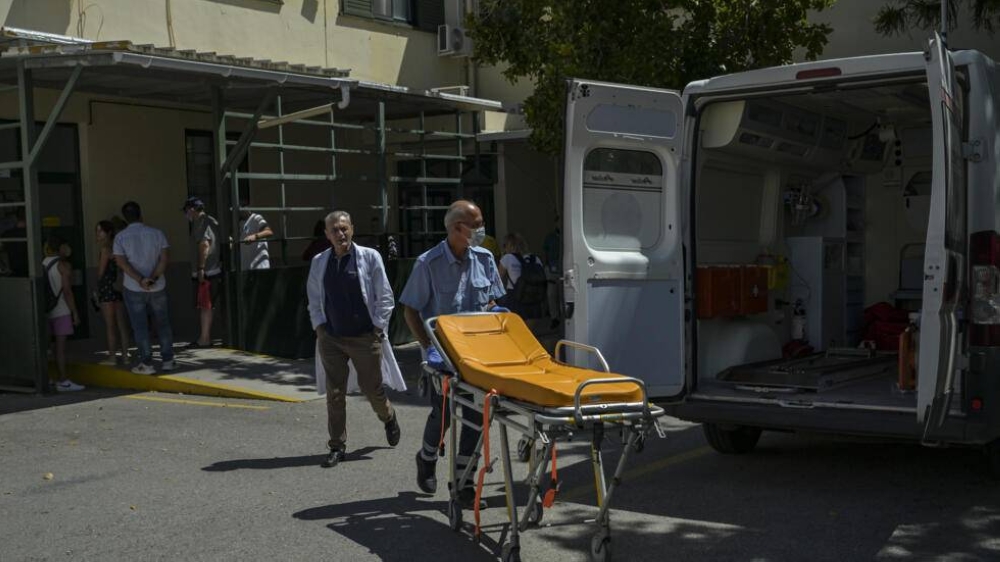When Maria's nephew had a car accident last month, the family had to wait around 40 minutes for the only operating ambulance on the Greek island of Kos to pick him up.
The middle-aged woman wondered how many more incidents will take place before health shortages -- a chronic problem on Greek islands that becomes even more acute with the influx of tourists in the summer -- will begin to be addressed.
"The doctors inside are amazing, but how long will they last?" she said, speaking on condition of anonymity.
In June, a 63-year-old woman had to be loaded on a pick-up truck as the Kos ambulance was occupied elsewhere.
She died on the way to hospital.
Another seven people have since died around the country due to a lack of ambulance availability, according to the victims' families.
Over a dozen islands face similar shortages, including global destinations such as Mykonos and Santorini.
Last month on the island of Evia, a local mayor had to personally rush to hospital a 75-year-old who had suffered a stroke.
- 'Tragic' shortages -
Garifalia Karanassiou, head of the Kos hospital staff association, said the island faces "tragic" healthcare shortages.
"Medical staff are fighting every day with whatever strength they have, they are exhausted, they work extra nights and don't get rest days off," she told AFP.
Medical workers say it takes 11 people to properly staff an ambulance on a 24-hour basis.
Kos currently has seven permanent and three temporary emergency medics.
Two of them are going to retire next year, according to hospital employees.
The island has two more ambulances that are sidelined for lack of a crew, while a third is rusting in a parking lot near the hospital.
To address the shortage, the government last month issued a temporary order permitting the use of firefighters, military personnel and municipal staff as ambulance drivers.
Doctors from the Greek state emergency centre EKAV, which operates the largest fleet of ambulances in the country, said the move is ill-advised.
They noted that as trained ambulance drivers are also required to deliver first responder aid on demand, using unqualified staff poses a major health risk.
"Makeshift solutions can only go so far, they cannot cure the problem," said Kos Mayor Theodosis Nikitaras.
"How can the fire brigade intervene in the summer when the driver might have a fire to deal with? We want permanent solutions," he said.
- Promise of reform -
Health authorities said that at least three ambulances are needed to cover the island of 40,000 permanent residents, a population which quadruples during the summer.
Airlifts are another option, but they cost between 6,000 and 20,000 euros ($6,500 to 22,000), said Karanassiou.
"These funds could be spent on having permanent staff on the island," she said.
Prior to his re-election in June, conservative Prime Minister Kyriakos Mitsotakis made reforming the chronically underfunded Greek national health service a top government priority.
He has promised to hire 10,000 health workers, including 800 ambulance drivers, and to deploy 250 motorcycle paramedics in urban centres.
But according to the confederation of public hospital employees (POEDYN), these hirings are barely enough to replace staff lost to retirement.
Because of the distance from the mainland, rough winters and housing shortages, medical staff are often unwilling to relocate to Greek islands.
And in attractive tourist destinations, homeowners prefer to rent their properties to visitors rather than to medical staff.
In 2021, the two general practitioners of Kos hospital resigned in 2021 without being replaced.
"To date, there have been seven tenders for the post, but there was no interest," said the hospital's deputy governor Ilias Chrysopoulos.
The hospital also lacks a cardiologist, paediatrician and radiologist, and tries to manage the shortage by temporarily moving doctors from other hospitals.
"Financial measures are needed to change the daily life of doctors and make it competitive with their colleagues working in the private sector," said Katerina Gavala, doctor and president of the Kos Medical Association.
Incentives are also needed on the scientific front, with regular training offered so that doctors do not lag behind in their professional development, she added.

